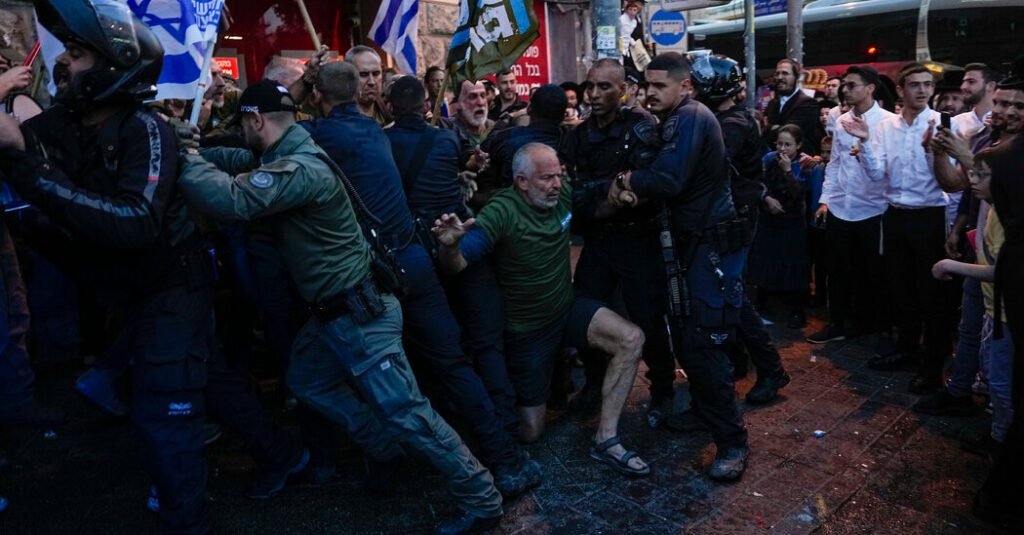Prime Minister Benjamin Netanyahu faced mounting challenges to power on Sunday as thousands rallied outside parliament to demand early elections in one of the biggest anti-government protests in Israel since the Gaza war began.
Some protesters carried signs calling for the “immediate removal of Mr. Netanyahu.” Others held placards calling for elections, saying “those who destroy cannot be those who build.”
The protest came a day after thousands of people took to the streets of Tel Aviv, waving flags and carrying pictures of Israeli hostages with signs reading “Hostage Deal Now.”
Elad Dreifuss, a 25-year-old university student protesting in Jerusalem on Sunday, said protesting against the wartime government was a difficult decision, but that “if the government can’t live up to its responsibilities, something has to change.”
The protests in Jerusalem, which were planned to continue until Wednesday, came as talks resumed in Cairo on a possible ceasefire and the release of hostages held by Hamas militants in the Gaza Strip. Bassem Naim, a Hamas spokesman, said the group had not sent a delegation there.
Mr Netanyahu has faced mounting pressure at home and abroad to prosecute Israel’s war in Gaza.
Close allies such as the United States have criticized the high civilian toll and called on Israel to allow more aid into the enclave, where death and starvation are widespread. And many Israelis have called on Mr Netanyahu to prioritize the release of the hostages, who were seized by Hamas on October 7 and are still being held in Gaza, as part of a ceasefire deal.
Some of the protesters outside the Knesset, Israel’s legislature, in Jerusalem were expected to remain in a cluster of tents there for several days.
“I think Israel is facing one of the most difficult times in its history,” said Moshe Radman, a businessman helping to organize the protest. “We need a government that will act for the betterment of the nation, not in the interests of a prime minister’s political and personal considerations.”
Mr Netanyahu, who underwent surgery to treat a hernia on Sunday afternoon, met in Jerusalem with families of soldiers held in Gaza, his office said. Early Monday, his office said the process was successful.
Mr Netanyahu, criticized by many Israelis for not claiming responsibility for the deadly Hamas-led attack in October, is faces growing calls to resign. He has consistently rejected criticism of his government and is calling for a lasting ceasefire, saying his government is seeking a “total victory” over Hamas.
At a press conference on Sunday, Mr Netanyahu hit back at criticism that he had not done enough to bring the hostages home. “I have done everything in my power and will continue to do everything to secure their release,” he said.
The last days. Pressure on Mr Netanyahu has mounted on another front as he faces a dispute over a bill to extend the exemption of ultra-Orthodox Jews from compulsory military service. This dispute could lead to the collapse of his government, which consists of a right-wing coalition of secular and ultra-Orthodox lawmakers. If the state does not extend the exemption, ultra-Orthodox lawmakers may leave the government. If the exemption is extended, lay members could opt out.
With the war nearing the end of its sixth month, Israel has faced repeated calls to agree to a ceasefire. At the Easter Sunday Mass, Pope Francis added his voice to these appeals.
“I call once again to ensure humanitarian access to Gaza,” he said, “and I call once again for the swift release of the hostages seized on October 7 last October and for an immediate ceasefire in the Strip.”
Israel’s war cabinet was expected to meet on Sunday to discuss issues related to a possible ceasefire.
The talks have stalled over divisions over the return of displaced Gazans to their homes, the permanency of the ceasefire and what an Israeli withdrawal from Gaza would look like, among other issues. Hamas said last week it had rejected an Israeli counterproposal.
A major sticking point is the fate of Palestinians living in temporary camps and shelters in southern and central Gaza. For months they had hoped to return to their homes in the north, but in an interview, Ghazi Hamad, a senior Hamas official, said Israel refused to allow Gazans to return en masse to the north and insisted they do so. so under “strict conditions and little at a time”.
Humanitarian officials have warned in recent days that only a ceasefire can allow aid groups to get enough food and other supplies into Gaza to avert an impending famine. More than 32,000 Palestinians have been killed during the war, according to Gaza health officials. About 1,200 people were killed in the Hamas attack, the Israelis say.
Egypt, Qatar and the United States, a staunch ally of Israel, have played the role of mediators in previous rounds of negotiations, with the two Arab nations acting as go-betweens with Hamas leaders. So far, however, a workable agreement has eluded all sides.
The report was made by Aaron Boxerman, Nada Rashwan, Cassandra Winograd and Jonathan Rice.

